Chiang Mai, Thailand, 4-7 November 2025 – The 31st Session of the Asia-Pacific Forestry Commission (APFC31) and Asia-Pacific Forestry Week (APFW) concluded in Chiang Mai, Thailand, with a call for strengthened regional collaboration on forest restoration, climate resilience, and sustainable livelihoods. Hosted by the Royal Forest Department of Thailand, the event brought together all the members, over 15 side events, focusing on advancing the bioeconomy and the role of healthy forests in securing a sustainable future for the Asia-Pacific region.
APFNet Side Event: "Healthy Forests for Future"

As part of the APFW, the APFNet organized a key side event titled "Healthy Forests for Future: Collaborating for Restoration, Livelihoods, and Resilience" on 5 November. The event, co-organized with the International Society of Tropical Foresters (ISTF), showcased successful models of regional collaboration that foster forest restoration, community empowerment, and sustainable livelihoods across the Asia-Pacific region.
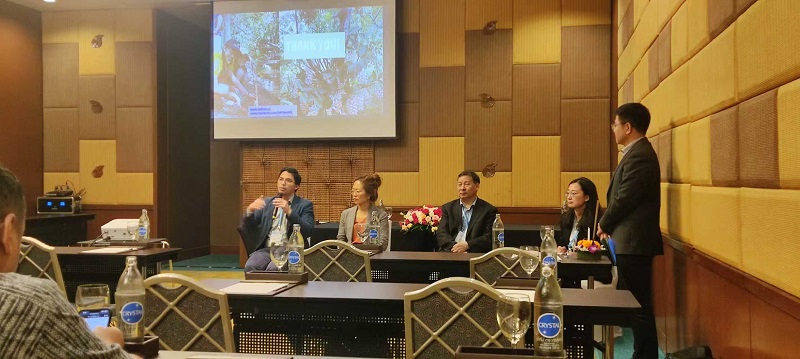
Drawing on a series of case studies from APFNet-supported projects, the side event highlighted how multi-stakeholder partnerships—comprising governments, local communities, and technical agencies—are driving impactful results in areas such as community forestry, agroforestry, and integrated land-use planning.
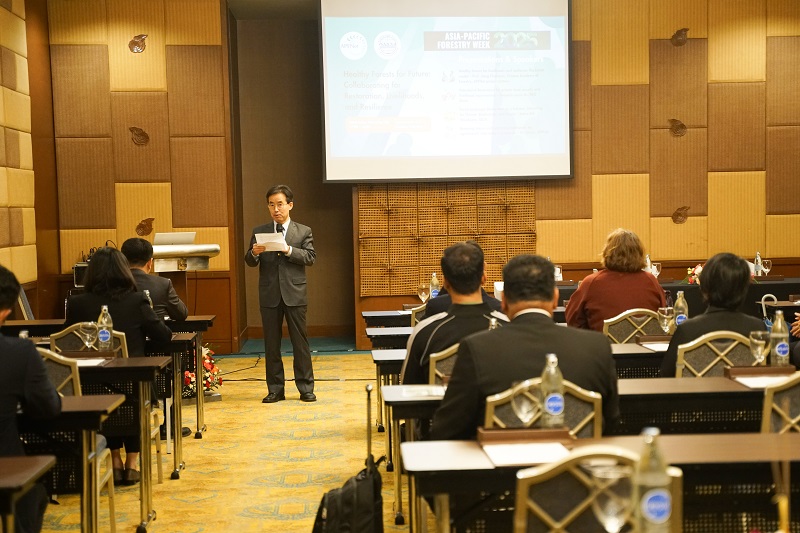
In his opening remarks, Dr. Wang Chunfeng, Executive Director of APFNet, emphasized the critical role of partnerships in achieving sustainable outcomes. He said, “Effective partnerships among governments, communities, and technical partners are essential for scaling up restoration efforts. These collaborations help strengthen the capacity of forestry professionals, address the challenges of climate change, and promote green and inclusive growth.”
Key Presentations Focus on Livelihoods, Restoration, and Climate Resilience
The side event featured insightful presentations from leading experts in the field:
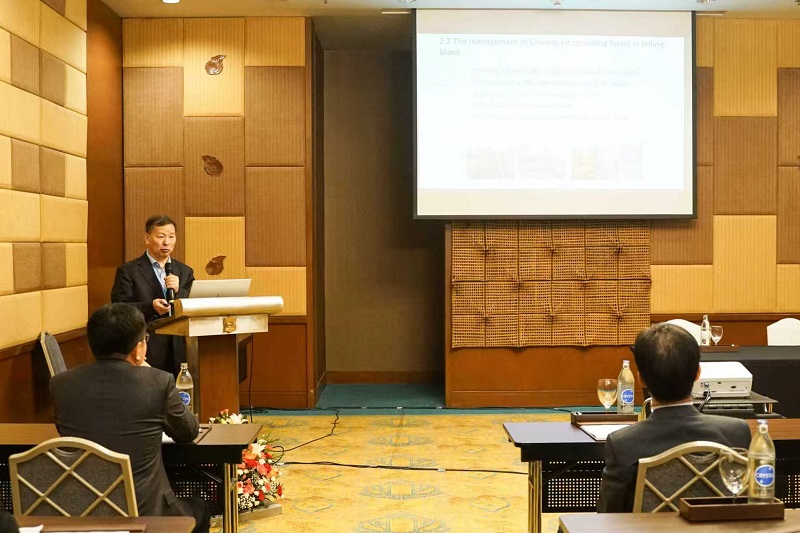
Professor Jiang Chunqian of the Chinese Academy of Forestry shared his experience with APFNet-funded projects, underscoring the importance of aligning forest restoration strategies with both community and policy needs. He stressed that effective coordination between local communities and policymakers is vital for long-term success.
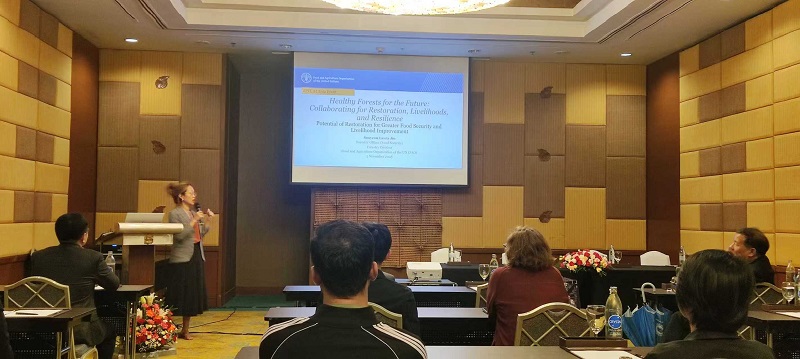
Ms. Sooyeon Laura Jin, from the FAO Forestry Division in Rome, discussed the pivotal role of restoration in addressing food security and improving livelihoods. She highlighted best practices and strategies for advancing restoration efforts that contribute to climate resilience.
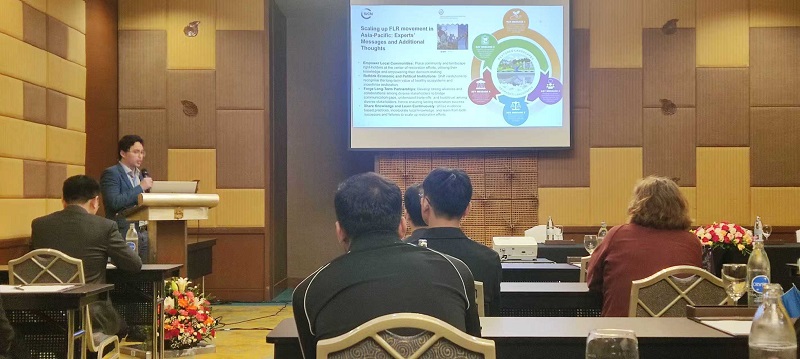
Satrio Adi Wicaksono from IUCN presented on Forest Landscape Restoration (FLR) as a solution to tackle climate change, biodiversity loss, and community development. He showcased the IUCN's work with tools like ROAM (Restoration Opportunities Assessment Methodology) and the Restoration Barometer to track and guide FLR efforts in the region.
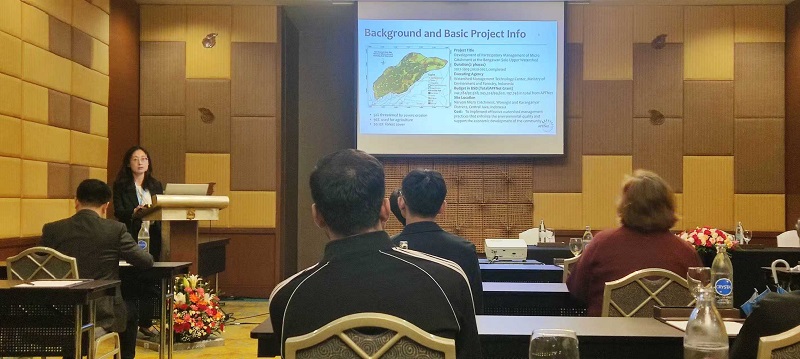
Ms. Xin Shuyu from APFNet gave a case study on agroforestry in Indonesia, illustrating how effective watershed management and community engagement have contributed to both environmental restoration and local economic development.
The side event successfully fostered an exchange of ideas and solutions among diverse stakeholders, reinforcing the need for collaborative efforts to build resilient forests and improve livelihoods across the region.
SEA FiMM - Fire Dialogue continues in Chiang Mai

At the side event organized by RECOFTC “Igniting change in Asia-Pacific: Food security through fire-free commodities and nature-based solutions in community forestry”, APFNet was invited together with AFoCo, and ITTO to share the regional and global interventions of knowledge exchange and best practices to learn from and help address the threat of forest fires to food security. Panelists shared information about the the ITTO toolkit, APFNet collaboration on SEA-FiMM, FLARE and RCOFTC CBFiM guidelines and initiatives.
Mr Huang Kebiao, from Planning division of APFNet, attended the side event and shared comprehensive introduction of the SEA-FiMM and Fire Dialogue which launched in May 2025 and its potential to strengthen the regional cooperation and shared learning.
APFNet Exhibition Booth: A Hub for Networking and Collaboration
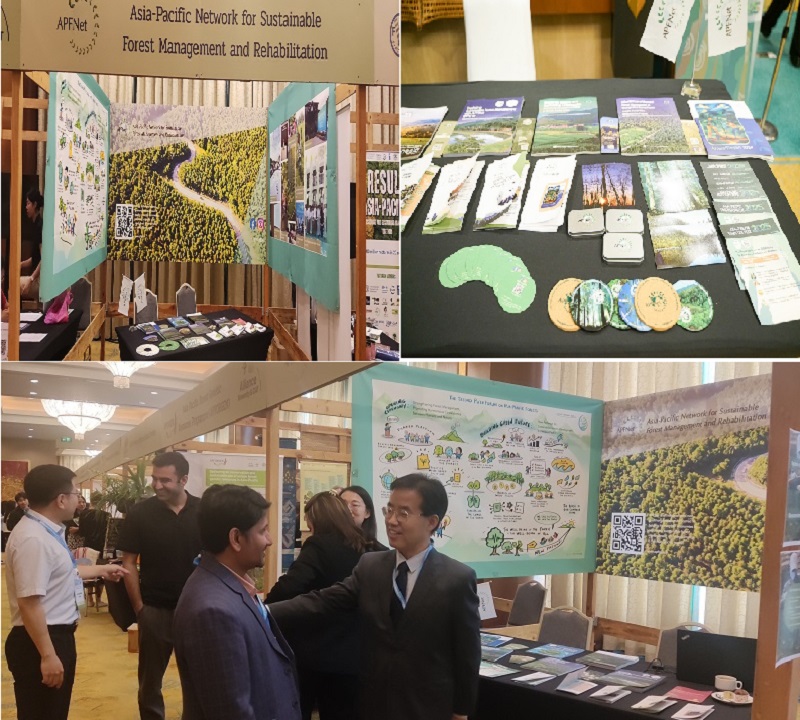
In addition to the side event, APFNet also set up a prominent exhibition booth at APFW, where visitors could explore recent publications, information on the 2nd Pu’er Forum, and APFNet’s ongoing projects. The booth served as a hub for networking, where old and new partners, forestry professionals, and stakeholders exchanged ideas, explored collaboration opportunities, and discussed the latest developments in forest restoration and sustainable forestry.
Looking Ahead
As the Asia-Pacific region faces increasing challenges related to climate change, biodiversity loss, and the growing demand for sustainable development, APFNet remains committed to fostering regional collaboration. The network’s ongoing efforts aim to integrate community-based approaches into large-scale forest programs, promote innovation in sustainable forestry practices, and strengthen the links between forest health, food security, and human well-being.
In his word, Dr. Wang Chunfeng remarked, “APFNet will continue to promote regional collaboration to scale up the impact of successful restoration practices. Our focus will remain on connecting forest health with food security and advancing inclusive, sustainable growth.”